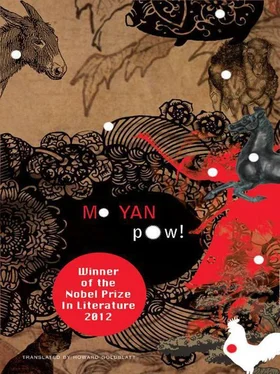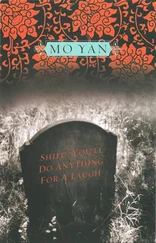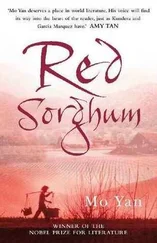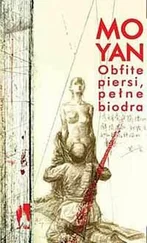Some time later we came to realize that he was like a kung fu master who would never pass on all his skills to his apprentices, someone who would always hold back enough for a safety net. Lao Lan's meat was water-injected, like everyone else's, but it looked fresher and smelt sweeter. You could leave it out in the sun for two days and it wouldn't spoil, while the others’ would be maggot-infested if it didn't sell by the first day. So Lao Lan never had to worry about cutting prices if his supply didn't sell right away; meat that looked that good was never in danger of going unsold. My father told me it wasn't water that Lao Lan injected into his meat but formaldehyde. Later, after relations between Lao Lan and our family took a turn for the better, Lao Lan told us that it wasn't enough for the meat to be injected with formaldehyde; in order to keep its freshness and colour, it also needed to be smoked with sulphur for three hours.
A woman who's covered her head with a red coat storms into the temple, interrupting my recitation. Her entrance reminds me of the woman who had been sprawled in the breach in the wall not long before. Where has she gone? Perhaps this woman in red is the incarnation of that one in green. She removes the coat and nods apologetically. Her lips are purple, her skin pasty, her face covered with grey lumps, like a plucked chicken. The light in her eyes is like the cold rain outside. She must have been partly frozen, and completely terrified. She doesn't know how to say what she wants, but it's obvious that her mind is clear. Her coat is made of a cheap fabric from which red water drips to the floor—blood, if I ever saw it. A woman, blood, lightning, thunder, the full range of taboos all at one time. She really needs to be driven out of the temple, but the Wise Monk sits in repose, his eyes shut, steadier even than the human-headed Horse Spirit behind him. As for me, I don't have the heart to force a young full-figured woman out into the storm. Besides, with the temple doors thrown open, anyone is free to enter, so by what authority can I drive her out? With her back to us, she holds her hands out through the door and turns her head away from the rain as she wrings out the coat, sending rivulets of red running across the ground to merge with the rain; the colour remains for a brief moment before flowing out of sight. It hasn't rained like this for a very long time. Water cascades off the eaves, a grey waterfall that imitates the roar of galloping horses. Our little temple shudders in the rain, the bats shriek in fear. Then water seeps in through the roof and bounces, with metallic pings, off the Wise Monk's brass washbasin. After wringing as much water out of her coat as she can, the woman turns and nods once again in a show of embarrassment. Her lips twitch briefly, emitting a thin mosquito-like whine. Those swollen lips look like overripe grapes, a more attractive colour than you see in town on that other type of woman standing beneath a street lamp, moving her legs seductively and puffing away on a cigarette. I notice how her white undergarments stick wetly to her skin, highlighting the curves of her body. Her taut breasts are shaped like frozen pears; they must be icy cold. If I could, I'm thinking, and I truly wish I could, I'd remove her wet clothes, have her lie in a tub of hot water to soak up its warmth and bathe from head to toe. Then she'd wrap a large, dry robe round her, sit on a soft, springy sofa, and I'd make her a cup of hot tea—black tea would be best—with milk, and give her some steamed bread. Finally, after the tea and the bread, she'd get into bed and sleep…I hear the Wise Monk heave a sigh, bringing an end to my fantasies, although I can't stop staring at her body. She's looking away now, leaning her left shoulder against the door as she gazes at the falling rain. Her coat, which she holds in her right hand, looks like a newly peeled foxskin. I‘ll continue, Wise Monk. My voice sounds unnatural because my audience has doubled —
My father and Lao Lan once had a savage fight, during which Lao Lan broke one of my father's little fingers and my father bit off a piece of Lao Lan's ear. Intense hostility broke out between our families, until Father ran off with Aunty Wild Mule; after that a friendship developed between Mother and Lao Lan, and he sold us his old walking tractor for what it would have brought as scrap. He even gave her free, hands-on lessons on how to drive it. Naturally, this was grist for the village gossip mill, which spread unsavoury rumours about Lao Lan and Mother, rumours that I, as the son, referred to as a passing wind, for the benefit of my Father, wherever he was. They were envious of my mother's ability to drive a tractor, and the mouth of an envious woman is little more than a stinking bunghole; words that emerge from it are nothing but a smelly passing wind. Money lined the pockets of Lao Lan, our village head and an impressive specimen of a man who grandly drove a truck into the city to sell his meat, someone who had seen every kind of woman there was. How could someone like that be attracted to my mother, whose hair was seldom combed, whose face was dirty more often than clean and who dressed in little better than rags? I remember him teaching my mother to manoeuvre the tractor on the village threshing ground one winter morning soon after a red sun had emerged over the horizon. A patina of frost covered the nearby haystacks as a red rooster perched on the wall, stretched out its neck and crowed loudly, momentarily drowning out the squeals of pigs waiting to be slaughtered. Puffs of milky white smoke rose from village chimneys; a train pulled out of the station and headed off into the sun. Mother was wearing one of Father's old khaki jackets—it was much too big for her—with a red electric cord round her waist as a belt. She sat on the tractor seat and gripped the handlebars. Lao Lan sat behind her on the edge of the cab, legs spread, hands on top of hers—a true hands-on lesson. Seen from front or back, he clearly had his arms round her. Though she was dressed like a train-station porter, devoid of any trace of femininity, she was still a woman, and that was enough for some of the village women's tongues to wag and for some of the village men's pulses to quicken. Lao Lan was rich, powerful and famously lecherous. Just about every remotely attractive female in the village had flirted with him at one time or another, and he didn't care what people said about him. But Mother was a woman whose husband had left her, and talk about widows is always particularly nasty, so she had to be careful not to give the village gossips anything to talk about. Despite that, she let him teach her his way; it was a sort of ‘blinded by greed’ decision. The tractor's diesel engine roared into life as wisps of steam rose from the radiator and the smokestack belched clouds of black smoke, all combining to give the lie to husky exhaustion and potent vigour. The machine carried them recklessly in circles, like a tethered ox being whipped to keep moving. Mother's pale cheeks began to flush and her ears turned as red as a rooster's cockscomb. It was bitterly cold that morning, a dry, windless cold that nearly froze the blood in my veins and nipped painfully, like a cat, at my skin. And yet sweat dotted Mother's face and steam rose from her hair. It was her first time with a machine, her maiden attempt to steer a vehicle of any kind, even one as simple as a walking tractor. She was in obvious high spirits, unbelievably excited. What other explanation could there be for breaking out into a sweat on one of the coldest days of the year? The light in her eyes stunned me by its beauty, the first time I'd seen anything like it since Father had run off. After a dozen revolutions on the threshing floor, Lao Lan jumped off with an agility that belied his obesity. As Mother tensed and looked round to see where he was, the tractor lurched towards a ditch. ‘Turn the handlebars!’ Lao Lan screamed. ‘Turn the handlebars!’ Mother clenched her teeth, tightened the muscles in her cheeks and managed to steer the tractor away only seconds before ploughing into the ditch. Lao Lan had been turning in place, following her progress, never taking his eyes off her, as if a rope were tied round her waist and the other end clenched in his hand, and shouting instructions: ‘Look straight, not at the wheels, they won't fall off. Don't look at your hands. They're too coarse, not worth looking at. That's it, ride it like a bicycle. I told you that you could strap a sow into that seat and it could drive it in circles. But you're no sow, you're a grown woman! Give it some gas, what are you afraid of? All dickhead machines are alike. You don't want to spoil it, just treat it like a pile of junk. The more you baby it, the more trouble it'll cause. That's it, now you've got it, you've stopped being an apprentice. You can drive it home. Mechanization is the future of agriculture. Know who said that? Do you, you little bastard?’ Lao Lan asked, looking at me. I didn't feel like answering—it was too cold and my lips were nearly frozen stiff. ‘Okay, drive it away. Since you're a widow and you have a little boy, you don't have to pay me for three months.’ Mother jumped off the tractor, her legs so rubbery she could hardly stand. But Lao Lan reached out to support her. ‘Be careful,’ he said. Mother blushed and looked like she wanted to say something but all she could manage was a brief stammer. The joy she felt had nearly robbed her of speech. A few weeks earlier we'd told Master Gao, the local clerk, that we wanted to buy Lao Lan's old tractor but hadn't heard back from him. I was only a child, yet even I knew we had no chance. My father had bitten a chunk off the man's ear and ruined his looks—there was no way he was going to sell us anything. If it'd been me, I'd have said: ‘So, Luo Tong's family wants to buy my tractor, do they? Ha! I'll drive it into the bay and let it turn to rust before I'll sell it to them.’ But then, just when we'd lost hope, we heard from Master Gao: ‘The village head is willing to sell it to you at scrap cost. He said you can pick it up tomorrow morning at the threshing ground. He said that he is, after all, the head of the village and that it's his job to see the villagers prosper. He said he'll even teach you to drive it.’ Mother and I were so excited we couldn't sleep that night. She kept saying what a good man Lao Lan was and what a bad man she'd married. And then she rounded it off with a stream of abuse for Aunty Wild Mule. That was when I learnt that Aunty Wild Mule had been the cause of the fight between Lao Lan and Father. I'll never forget that morning. That time it was early summer.
Читать дальше












